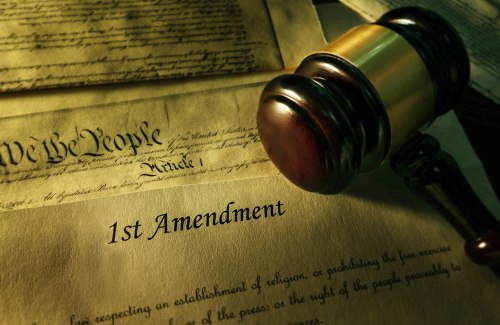Flipping the bird is protected by First Amendment, federal appeals court says in cop-stop case

Photo by zimmytws/Shutterstock.com.
A federal appeals court has refused to toss a lawsuit against a Michigan police officer accused of upgrading a traffic ticket to a more serious violation because a driver raised her middle finger at him.
The 6th U.S. Circuit Court of Appeals at Cincinnati ruled Wednesday that the officer was not protected by qualified immunity because the alleged constitutional violation clearly infringed on established rights. The Washington Post has coverage, while How Appealing notes the opinion.
The Taylor, Michigan, officer, Matthew Minard, pulled over Debra Cruise-Gulyas for speeding in June 2017 but gave her a ticket for a lesser violation. She flipped him the bird as she drove off. Minard pulled her over a second time and amended the ticket to the more serious speeding offense, according to the allegations.
“Fits of rudeness or lack of gratitude may violate the golden rule,” Judge Jeffrey Sutton wrote in the panel opinion. “But that doesn’t make them illegal or for that matter punishable or for that matter grounds for a seizure.”
Sutton said that, if Cruise-Gulyas’ allegations are true, Minard violated her right to be free from an unreasonable seizure under the Fourth Amendment, as well as her free speech rights under the First Amendment.
“Any reasonable officer would know that a citizen who raises her middle finger engages in speech protected by the First Amendment,” the court said. “Minard, in short, clearly had no proper basis for seizing Cruise-Gulyas a second time.”
Cruise-Gulyas told the Washington Post that she gave Minard the finger after receiving the ticket because the area was a notorious “speed trap.”
See also:
ABA Journal: “When do rants exceed First Amendment boundaries and become true threats?”



